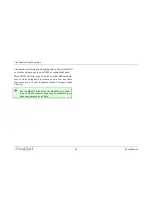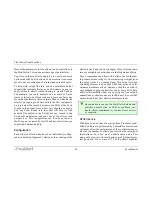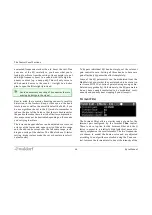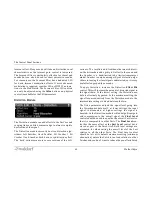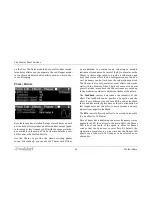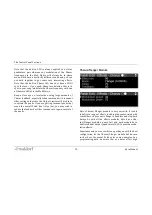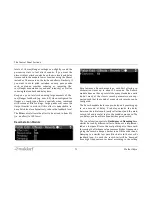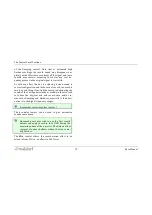
The Control Panel Sections
68
Kyra Manual
The Delay module allows feedback varying from zero (no
repeats) up to unity (infinite repeats). Like a tape delay,
there is a slight roll-off of higher frequencies in the feed-
back loop although this is only noticeable if the delay time
is short and the feedback is very high.
The Delay module can be configured for regular stereo
delay or ping-pong mode. In ping-pong mode, the repeats
will alternate between the right and left outputs as the
feedback paths are swapped. Ping pong delay is particu-
larly useful if the original sound is panned to the left as the
echoes are then balanced. It can also be useful for choral
strings and pads as it can generate multiple 'surround'
echoes to add depth to the sound and supplement the early
reflections of the Reverb module. Another use for ping-
pong mode is to add a faux stereo effect - select a very
short delay setting of 2 or 3 and moderate amounts of
feedback. Increase the dry/wet mix and feedback amount
until a pleasing stereo effect is heard. This is a great way to
add stereo width to a sound without resorting to Dual
Mode configurations.
The dry/wet
Mix
control allows the intensity of the delay
to be adjusted from completely dry (effect bypassed) to
equal dry/wet mix (50% wet). Note that unlike the other
effects, the
Mix
control on the delay module ranges
between 0 and 50% wet rather than 100%. The most
useful range is around 10-30 which offers a natural balan-
ce between the initial sound and the echoes.
The Delay module can be synchronised to the tempo of
your song by means of MIDI clock synchronisation. When
the Delay module is configured to synchronise to MIDI
clock, a beat setting is available to adjust the ratio of the
delay value to MIDI clock. The Delay module can also be
locked to the timing of LFO3 (even if LFO3 is itself set to
external clock), again, the beat setting is available to adjust
the ratio of the LFO timing to the beat. When the DDL is set
to MIDI clock and a MIDI clock is present on the MIDI port
configured for MIDI clock, the
Delay Time
control will
have no effect until the clock is stopped or the clock source
is set to Internal. As the
Delay Time
control is quite coarse
so that it can cover a wide range of delays, if you need
precise tempo matching, use MIDI clock synchronisation to
achieve accurate sync.
The
Delay Time
control will cause considerable pitch
distortion if it is changed (whether it is changed manually,
by Mod Matrix modulation or by a MIDI clock change)
whilst there is audio in the delay module. The resulting
sound is very much like the scratch effects made popular
in early rap music and with long or infinite feedback can be
a useful standalone effect - try modulating the delay time
with an LFO routing. If this effect is not desired, it is best
not to change the delay time setting when audio is playing
Summary of Contents for KYRA
Page 1: ...USER MANUAL ...







